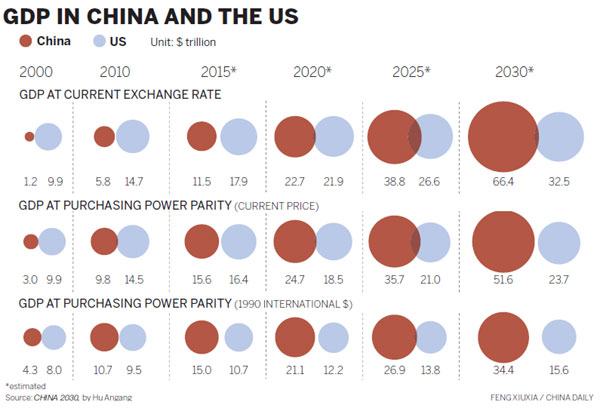Fast forward
Updated: 2013-05-03 08:56
By Andrew Moody and Lv Chang (China Daily)
|
||||||||

"In some sense, it is entirely plausible that China could become twice as big as the US by 2030," she says.
"There is phenomenal room for growth in China, space for major industrial development and once China gets its own world-class companies they have a huge domestic market as well as an international market to serve."
She points out, however, that for China to make such progress it would have to achieve near double digit growth for a continuous period of nearly 40 years, which would be almost unprecedented in economic history.
"There are really few examples of that. You would expect some hiccups along the way."
George Magnus was one who forecast such a hiccup in his book, Uprising: Will Emerging Markets Shape or Shake the World Economy? published two years ago.
He anticipated a so-called "Minsky moment", a phenomena named after the US economist Hyman Minsky who warned economies faced an investment bust if they became over-leveraged.
One possible crunch time for China could be around 2015 and 2016 when a lot of local government debt - where China's overall debt has become centered - has to be repaid or rescheduled.
"People have kept reminding me since I wrote the book that the investment bust hasn't happened yet but there is always a risk of it and that would slow growth."
Magnus, senior independent economic adviser at UBS in London, believes it is possible China could become the world's biggest economy by 2018 and twice as big by 2030 but they are more like "spreadsheet" calculations.
"There is a danger of it being just a mathematical exercise. You could have a scenario where China grew by 8 percent one year and then by 4 percent in four successive years or smoothly by 5 percent in five successive years. You would get the same outcome but it would be a very different type of growth since the first type would involve a significant slowdown."
The quality of China's growth is something that concerns Gary Liu, executive director of CEIBS Lujiazui Institute of International Finance in Shanghai.
"The problem is not about how big the Chinese economy can become but the quality of that growth.
"I believe that quality is bad in China and it has been at the cost of people's health. You can feel how bad the air and water quality are. I am afraid in the coming years we will see more people get serious diseases - even cancer - in China. This is not a small issue."
Liu believes Hu's prediction of China becoming double the size of the US as off the scale and he doesn't expect China to even get to the same level until 2033.
"There is a danger of underestimating the strength of the US economy and its ability to innovate. It will probably begin to grow again by 3 or 4 percent or even higher. If that happens and China slows down, it is going to take a while to catch up."
Duncan Innes-Ker, senior China analyst for the London-based Economist Intelligence Unit, argues that there would have to be significant improvements in China's business environment before China could make such a rapid advance.
"There needs to be major reform of the legal system and regulatory environment to put China on a level with developed countries."
He believes the Chinese economy faces significant future headwinds, particularly with its labor force shrinking by 11 percent from 798 million in 2013 to 718 million in 2030. He expects China to catch up with the US by 2023; but as to when it is double the size he says is out of his forecasting range.

 Michelle lays roses at site along Berlin Wall
Michelle lays roses at site along Berlin Wall
 Historic space lecture in Tiangong-1 commences
Historic space lecture in Tiangong-1 commences
 'Sopranos' Star James Gandolfini dead at 51
'Sopranos' Star James Gandolfini dead at 51
 UN: Number of refugees hits 18-year high
UN: Number of refugees hits 18-year high
 Slide: Jet exercises from aircraft carrier
Slide: Jet exercises from aircraft carrier
 Talks establish fishery hotline
Talks establish fishery hotline
 Foreign buyers eye Chinese drones
Foreign buyers eye Chinese drones
 UN chief hails China's peacekeepers
UN chief hails China's peacekeepers
Most Viewed
Editor's Picks

|

|

|

|

|

|
Today's Top News
Shenzhou X astronaut gives lecture today
US told to reassess duties on Chinese paper
Chinese seek greater share of satellite market
Russia rejects Obama's nuke cut proposal
US immigration bill sees Senate breakthrough
Brazilian cities revoke fare hikes
Moody's warns on China's local govt debt
Air quality in major cities drops in May
US Weekly

|

|








